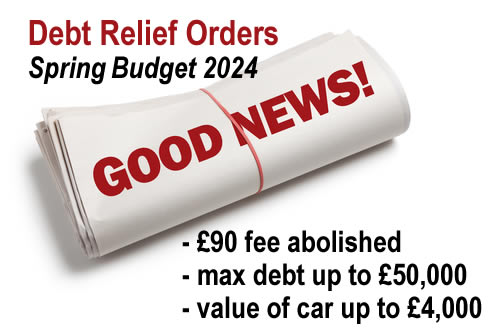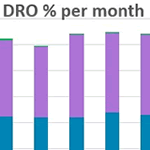
In a Spring Budget that was short on surprises, the Chancellor pulled a large rabbit out of the hat for debt advisers and some of their clients – big changes to the rules for Debt Relief Orders (DROs).
DROs are a form of insolvency for people who have little or no spare income to be able to make any payments to their debts and who only have low assets. Introduced 15 years ago, they were intended to provide a simpler and cheaper path through insolvency for the individual.
The proposed changes for England and Wales are in 3.41 of the Budget Report:
At Spring Budget, the government is removing the £90 administration fee from 6 April 2024. The government is also raising the maximum debt value threshold from £30,000 to £50,000 and increasing the maximum value of motor vehicle that an individual can retain from £2,000 to £4,000, from 28 June 2024.
Abolishing the £90 fee
Many people who need a fresh start from their debts are unable to afford the £90 DRO fee. If you have no spare income at all, or even a negative budget, it can be a slow and difficult process to try to save up the £90. This can result in debt advisers making time-consuming grant applications to try to raise the fees.
All this will be unneccessary from April when the £90 fee is abolished – a big help to thousands of people a year.
Raising the maximum total debt to £50,000
When DROs were introduced, the limit on the total debt you could have to be eligible was £15,000. This was increased to £20,000 in 2015, then to £30,000 in 2021.
Someone over the limit has to go bankrupt instead. Bankruptcy has a much higher fee for the individual to raise and is much more expensive for the Insolvency Service to administer. Increasing this limit to £50,000 is very sensible. There do not seem to be any good reasons why someone with say £45,000 should have to go down the expensive route of bankruptcy if they have no assets that would be realised and do not have any spare income to make any monthly payments in bankruptcy.
Doubling the permitted value of a car
A car is essential for many people who need DROs. For example, care workers, night shift workers, and people juggling work and getting children to school may find public transport impractical. Bus coverage has got worse over the last ten years in many areas.
For these workers, a car is not a luxury. And one that is worth less than £2,000 is very often too unreliable and so too expensive to run. In London, it can be almost impossible to buy a second-hand car under £2,000 that passes the ULEZ rules,
As a result, the current £2,000 car limit can be a barrier to people choosing a DRO at present. They are left with a choice between an IVA where they cannot really afford the monthly payments or just making token debt payments forever and not getting a clean start.
A £4,000 limit is a big improvement for DROs.
Very good news
These three changes together are very good news for people who need DROs in England and Wales.
The Insolvency Service should bring the value of a car that can be retained in bankruptcy into line with new DRO 4k limit. And scrapping the DRO fee highlights the insanity of charging someone a fee of £680 to go bankrupt. And the DRO eligibility rules in Northern Ireland will be even further behind England and Wales.
But at the moment I am just happy there is more help for many of the poorest debt advice clients.



Jane Lily Carpenter says
At last the government has finally seen sense and abolished the DRO fee. About time!
Nigel says
Hi people,
Has any person on here found a different case number in there Experian report that show a totally different dro number?
Regards
Sara (Debt Camel) says
I haven’t heard of anyone else having this problem
Nigel says
I have, Experian made up a internal case number and claimed it was from the IS, I told ico and they asked Experian to change it which they did and made up some bs and reverted back. Now I’m in court even Experian admitted it in there defence it was wrong. So if you look under case number on Experian bankruptcy, ccj or IVA there’s alot floating about on there system there senior internal staff knows about. If Experian made it up you accounts will not be updated as the wrong case number won’t match up with your proper dro number
Sara (Debt Camel) says
so you have a court case ongoing?
Nigel says
Yes, Experian said that that number makes no difference it’s internal and made up by them. Ask your member’s to check there Experian report and still if it shows there correct dro number
Mike Sargeant says
A useful article on a surprising change to DROs.
Some questions:
Will the new debt limit come into effect in April 24?
What options do individuals have who may be part way through the DRO application process to postpone their application to take advantage of the “no cost” DRO in April?
What will be the impact on Intermediaries and funding?
Sara (Debt Camel) says
I think its only scrapping the fee in April. The two limit changes come in towards the end of June
Briar Harley says
I’d seen the news about the £90 fee being abolished but not the rest of it. This is such great news! I know some people are going to be very happy about this.
ffionpearl says
I really hope the DRO limit increase to £50,000 will mean less clients who need a bankruptcy. But it is more than a little disappointing that nothing has been done for the remaining bankruptcy clients. Someone I met recently did their own online bankruptcy due to waiting time for a debt appointment. That kind of situation is going to become even more heart-rending now that there is such a difference between the 2 options
John Roberts says
Succinct and to the point
Dean Russell says
Thats good news
I just wish they would go that one step further, all debts are automatically included up to the date of submission unless they have gone over the threshold, it would make the life of AI so much easier.
Sara (Debt Camel) says
I agree.
Debra Ward says
Hi are you able to do another DRO after the last one was removed from the credit file ?
Sara (Debt Camel) says
After 6 years you can have a second one.
Elaine Ann De Boeck says
What happens if someone is in debt and needs a DRO, what would they need to pay?
Sara (Debt Camel) says
From April there is no fee. Talk to your local Citizens Advice or national Debtline on 0808 808 4000
Anonymous says
Whilst this all very welcome, reasons people get into debt need to be tackled like low pay, benefits at below true substance level, unaffordable housing, better distribution of wealth
Anonymous says
Welcome news. But, to state the obvious, the cause of poverty and debt needs to be addressed such as low pay, benefits below subsistence level, unaffordable housing, wealth inequality and better distribution.
Fine to do a DRO and eg avoid possession proceedings and deal other priority debt, if still no money post granting DRO debts just continue to accumulate…
Alexander says
Will AI’s and the DRO unit be swamped from June when more people will be eligible? There will be unintended consequences to this change made with no consultation. It could turn out like the Curate’s egg.
Sara (Debt Camel) says
I don’t think so. Cases should go through a bit quicker.
Isla Biggs says
I don’t think the DRO Unit will be too badly affected. There will be fewer AIs phoning to check if clients have paid. However, AIs will be inundated, as happened last time the limits changed, with more applicants than ever and fewer Competent Authorities offering DROs.
Steve says
Will Scotland benefit from this.
Sara (Debt Camel) says
No, Scottish debt solutions can be very different and a DRO isnt one of them.
Andrea Carlisle says
Whilst this is great news for people with problem debt, it’s a damning indictment of a government that thinks getting people out of debt is cheaper than preventing them from getting there in the first place!
Sara (Debt Camel) says
There will always be some people in problem debt. It’s a damning indictment of a system that puts obstacles in the way of people getting a clean start – obstacles that benefit no one and cost very very little to remove. Fewer than 8000 people went bankrupt last year, scrapping the bankruptcy fee would cost less than 10 million pounds even if it double the number of people who go bankrupt.
Claire says
But you can’t get a DRO if you have a home that’s mortgage is that the case?
Sara (Debt Camel) says
yes. It is an insolvency option for people who do not have significant assets
Chris says
Thanks Sara, an interesting read and certainly good news for many of our clients who historically struggled to access fee’s.
How do you feel that the intermediary payment made from the DRO fee will affect providers. MW were doing 1800 DRO’s p.m, so that £10 payment would be worth over £200k p.a. That’s a massive funding cut.
For smaller providers like us it was worth £5-10k p.a which sounds small, but is significant in a climate of increasing overheads – I can’t see MaPS making up the loss
Sara (Debt Camel) says
I understand that the Insolvency Service is going to continue to pay these £10 amounts.
Deborah says
if my husband applies for a DRO what happens to our car
We have been paying for it since 2021 and have two years left before it’s paid for. We use our car for our daughter who suffers from severe depression and anxiety. It’s prob worth about £5500 Will they allow it on medical grounds or can I take over the payments ? Thank you
Sara (Debt Camel) says
The finance is in his name?
Deborah says
Yes Just wondering if the finance company would consider
Me taking over the payments
Sara (Debt Camel) says
That depends on the finance company, but you would have a good reason to complain if they decided to repossess the car. I think your husband should talk to a debt adviser about a DRO – phone National Debtline or go to his local Citizens Advice.
Mark Briton says
The Insolvency Services does not monitor DROs at all after approval, which explains the fact that less than 1% are revoked. That of course is not the case with bankruptcies, IVAs or even debt management plans nowadays. DROs are therefore wide open for abuse, and I know of several people who are already taking advantage of the lax process. I doubt Sara will allow this comment because it’s critical.
Sara (Debt Camel) says
I am not aware of any monitoring of bankruptcies once a decision is taken that no IPA will be set.
Junee says
Can my landlord (housing association) be able to seek possession of the return of property even if I do a dro?
And could a dro be a breach of tenancy?
Sara (Debt Camel) says
do you have rent arrears?
can I ask if you live in Scotland?
Junee channer says
Yes there’s rent arrears, I live in lambeth
Sara (Debt Camel) says
OK, go to your local Citizens Advice and ask – they can set up a DRO if you need one and they are likely to know what the local Housing Association policies are